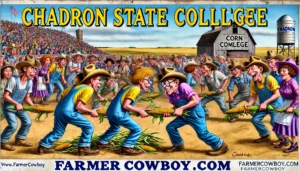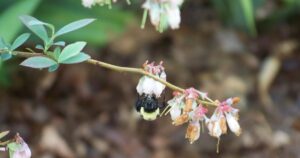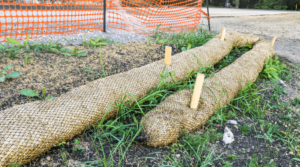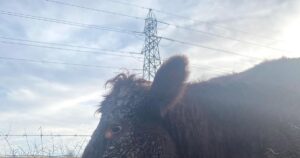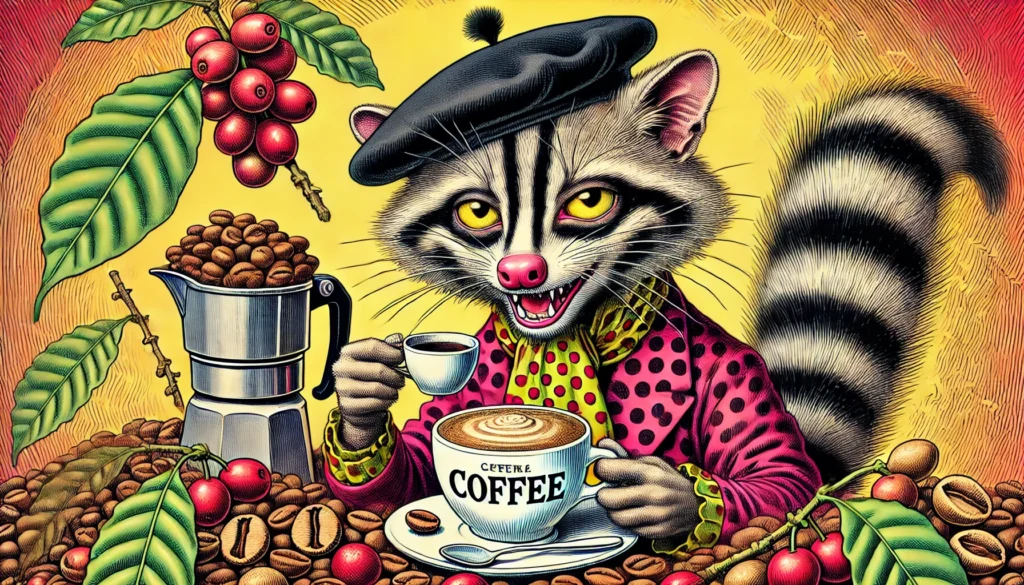
A vivid and detailed wide illustration in the style of Mad Magazine showing a civet cat as a coffee connoisseur. The civet is depicted with a smug exp.webp.webp
What is Kopi Luwak Coffee?
Kopi Luwak coffee, often hailed as the world’s most luxurious brew, originates from Indonesia and involves a unique process. It starts with the Asian palm civet, a small mammal that consumes ripe coffee cherries. The cherries undergo fermentation in the civet’s digestive system before being excreted. These beans are then collected, thoroughly cleaned, and roasted to produce a smooth, rich coffee with reduced acidity. Renowned for its distinctive flavor and labor-intensive production, Kopi Luwak’s exclusivity and price make it a coveted choice among coffee connoisseurs worldwide.
Civet: The Coffee Connoisseur
Forget about hipster baristas in trendy Lubbock cafes; the true coffee connoisseurs are civet cats. These picky eaters only consume the finest and ripest coffee cherries, leaving the rest to us mere mortals. Their high standards ensure that every cup of Kopi Luwak coffee is nothing short of extraordinary. “It’s like having a gourmet chef in the wild,” says Bob, a farmer from the King Ranch. “These cats have better taste than most humans!”

From Forest Floor to French Press
There’s something poetic about picking up after a civet in the wild, only to later sip the results in your chic, urban apartment in Central Valley, CA. It’s a journey that involves a bit of adventure and a lot of trust in nature. The civet’s digestive process ferments the beans, adding a unique flavor profile that coffee aficionados swear by. “It’s like the ultimate nature-to-table experience,” says Jane, a coffee enthusiast from the Red River Valley.

Nature’s Perfect Processing Plant
Who needs high-tech machinery when you have a civet’s digestive tract? This natural process is both eco-friendly and utterly bizarre. The beans are naturally fermented as they pass through the civet, resulting in a smoother, less acidic coffee. “It’s the most organic process you can imagine,” says Dr. Green, a professor of agriculture in Stephenville, TX. “And it’s sustainable, too!”

Coffee: The Ultimate Recyclable
Reduce, reuse, recycle! Who knew that included reusing coffee beans straight from a civet’s output? It’s the epitome of eco-friendly farming. By using what the civets leave behind, farmers can produce a high-quality product without the need for harmful chemicals or excessive processing. “It’s like nature’s own recycling program,” says Farmer Joe from Windthorst, TX. “We just follow the civets around and pick up their droppings.”

A Brew Worth the Journey
They say it’s about the journey, not the destination. But when the journey involves a civet’s digestive adventure, the destination—your cup—better be amazing! And it usually is. Kopi Luwak coffee is renowned for its rich, smooth flavor, which many attribute to the unique fermentation process it undergoes. “It’s a wild ride, but totally worth it,” says Lisa, a barista in Cody, WY. “Each cup tells a story.”
The Most Expensive Litter Box
When you’re farming Kopi Luwak, every civet is sitting on a goldmine. Their litter boxes are worth more than most people’s rent! These beans can fetch up to $600 per pound, making them one of the most expensive coffees in the world. “It’s like harvesting gold nuggets,” says Tom, a farmer in Plymouth, WI. “Only smellier.”
Coffee with a ‘Wild’ Kick
Looking for a wild start to your day? How about a cup of coffee that’s been through the wildest digestive rollercoaster? Kopi Luwak is nature’s adrenaline shot, offering a unique and robust flavor profile that’s hard to beat. “It’s the perfect way to wake up and feel connected to nature,” says Amy, a student in the Corn Belt. “Plus, it makes for a great conversation starter.”
From Crap to Cup
It’s the ultimate rags-to-riches story. These beans start off as mere cherries, become civet droppings, and end up as the world’s most luxurious coffee. Talk about an underdog story! “It’s like the Cinderella of coffee beans,” says Professor Brown from the University of Texas. “A true transformation.”
The Civet’s Secret
Ever wonder if civets have a laugh knowing they’re the stars of the gourmet coffee world? They must be thinking, “Humans will drink anything!” Indeed, the process might sound off-putting, but the result is a coffee that’s second to none. “I bet the civets are rolling in laughter every time they see us humans scrambling for their droppings,” jokes Mark, a coffee farmer in the 6666 Ranch.
The Price of Prestige
When you’re sipping Kopi Luwak, remember: you’re not just drinking coffee; you’re drinking the world’s most luxurious… well, let’s just say it’s a very special process. The high price tag reflects the labor-intensive process and the limited supply. “It’s not just coffee; it’s an experience,” says Sarah, a coffee shop owner in the Central Valley, CA. “An expensive one.”
Gourmet in the Wild
Who needs Michelin stars when your coffee beans get gourmet treatment straight from the forest? This is farm-to-table with a twist. The civets are the original gourmet chefs, providing a unique flavor that can’t be replicated by any machine. “It’s like getting a five-star meal in a jungle,” says Peter, a foodie in Red River Valley.
Digestive Delicacy
Next time someone brags about their artisanal coffee, you can top them with, “Oh, mine’s been digested by a wild animal.” That’ll end the coffee-snob showdown! Kopi Luwak’s unique process makes it the ultimate conversation piece. “It’s the perfect way to one-up any coffee snob,” says Rachel, a college student in Lubbock, TX.
A New Kind of Gold Rush
Prospectors used to search for gold nuggets. Now, they’re searching for civet nuggets. Times sure have changed! The demand for Kopi Luwak has turned civet droppings into a valuable commodity. “It’s like striking it rich in the most unexpected way,” says John, a modern-day prospector in Windthorst, TX.
Coffee by Nature
If anyone doubts the power of nature, just remind them: civets do what entire factories can’t, producing the world’s most coveted coffee beans. Mother Nature knows best! “It’s the ultimate testament to nature’s ingenuity,” says Professor White from the University of Texas. “We can learn a lot from these little creatures.”
Disclaimer
The views and opinions (especially the outlandish ones) expressed in this article are the creation of farmers and a cowboy. They do not necessarily reflect the views of The Evil Empire (Google) or its employees. Any resemblance to actual persons, cows, tractors, or vegetables, or glowing phenomena is purely for the sake of amusement. No civets were harmed in the making of this story, although some may have had their egos inflated. If you’re seriously considering starting a Kopi Luwak farm, remember: follow the civets, but don’t expect them to share their royalties!
Originally Published at FarmerCowboy.com
2024-06-26 10:49:08
Originally posted 2024-06-28 18:01:43.
Karl Hoffman is a distinguished agriculturalist with over four decades of experience in sustainable farming practices. He holds a Ph.D. in Agronomy from Cornell University and has made significant contributions as a professor at Iowa State University. Hoffman’s groundbreaking research on integrated pest management and soil health has revolutionized modern agriculture. As a respected farm journalist, his column “Field Notes with Karl Hoffman” and his blog “The Modern Farmer” provide insightful, practical advice to a global audience. Hoffman’s work with the USDA and the United Nations FAO has enhanced food security worldwide. His awards include the USDA’s Distinguished Service Award and the World Food Prize, reflecting his profound impact on agriculture and sustainability.

